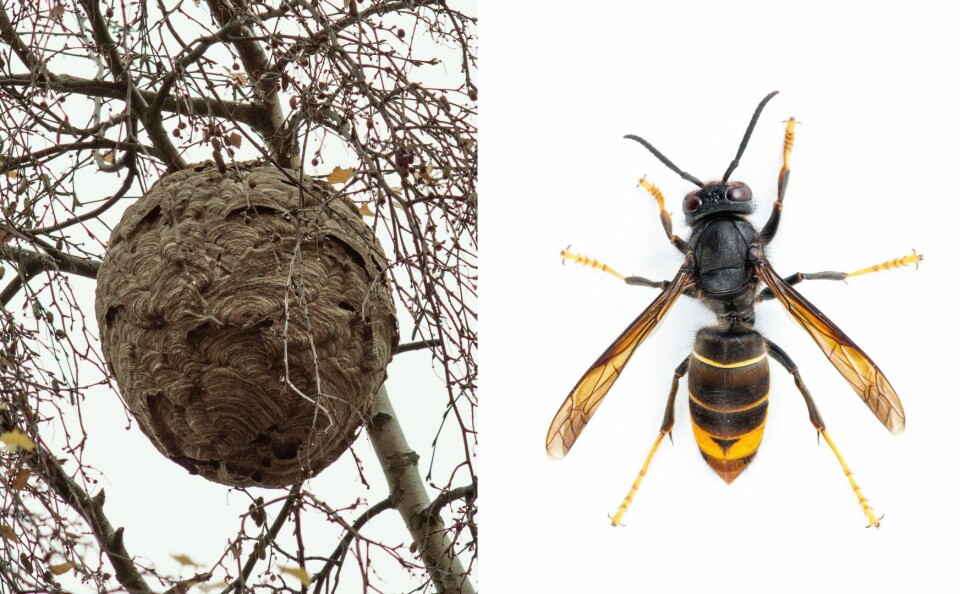-
White storks make strong return in France via nest ‘platforms’ and clipped wings
The Ligue pour la Protection des Oiseaux shares the conservation challenges in saving these birds from extinction
-
Efforts to reintroduce black vultures in France
Plus, wildlife spotter, Jonathan Kemp, shares his experience of searching for bearded vultures around his home in Aude
-
French nature festival is a paradise for bird watchers
The spring event runs from April 12-20, showcasing the rich flora and fauna of the Baie de Somme
Do not destroy Asian hornet nests - new advice from French experts
Research shows birds feast on the grubs inside during winter when food is scarce

New scientific advice is that Asian hornets’ nests should be left in place, rather than destroyed in winter.
The hornet, which is smaller than its European counterpart but with a longer sting, makes large, closed nests, almost always found in the tops of trees.
They can reach the size of a large beach ball and are often removed when they become visible after autumn leaf fall.
However, research now suggests it makes little sense to do so, not least because they provide a valuable winter food source for birds.
Read more: Asian hornets are still prolific in France due to mild autumn
What happens inside a nest in winter?
Samuel Jolivet, director of the Office pour les insectes et leur environnement, said: “Like European hornets and wasps, the Asian hornets in a nest all die off by the end of winter.
“The fertilised queens leave the nest at the end of summer and hide in cracks of wood until the next spring, which leaves all the workers in the nest (populations can be several thousand) completely disorientated and they start to die off.”
Before they die, the workers continue to feed the larvae left in the nest by fetching insects, which they turn into a kind of ‘soup’.
The adults themselves feed only on nectar or juicy fruit, which is why late-flowering plants sometimes seem to be swarming with them.
Birds know nests are a source of food
“What we have noticed is that birds keep an eye on the hornet nests and once the population of workers starts to decline, they attack the nest to get at the grubs,” said Mr Jolivet. “It is the time of year when birds struggle to get food and so having the grubs is a boost.”
Jays and magpies are particularly good at opening the nests but many different species have been seen feeding on them.
Little threat to humans, but honey bees at risk
Mr Jolivet stressed that Asian hornets, like European ones, attack humans only if they or their nests are threatened.
Read more: French hornet attack: how to spot the insects and treat the stings
“There have been cases where footpaths go along the side of hills, putting the path at the level of treetops lower down the hill.
“When leaves have fallen, large Asian hornet nests have been found near the path, but they were there all summer and no one knew or was threatened.”
The main problem with Asian hornets is that they kill honey bees to feed their larvae.
They have been blamed for decimating hives, and Mr Jolivet says that, in these instances, simple traps using sugar water are an effective deterrent.
‘They are now part of French wildlife’
Asian hornets (frelons asiatiques in French) were reportedly first identified in France by an amateur entomologist near a garden centre that had imported pottery from China.
The entomologist owned the garden centre, leading to speculation that the hornets came in with the pottery.
He disputes this, arguing that by the time he made the identification, Asian hornets were already widespread in France.
“It is not important how they got into the country – what modern DNA testing tells us, though, is that the whole population of Asian hornets in France comes from just one fertilised queen around the year 2000, who evidently found it a very hospitable country,” said Mr Jolivet.
“They are now part of the wildlife of France.”
Last year, France announced an eight-year plan to combat them, as well as other invasive insect species.
It focuses on prevention and early action, including raising awareness of invasive species and improving best practices on how to prevent their spread.
Read more: France to take action against Asian hornets and other invasive insects
Related articles
‘Sex traps’ can control Asian hornets, new French-Chinese study shows
Normandy black bee gets protected species status and queen bee project
Why are bees dying in winter? French beekeeper survey may help
























